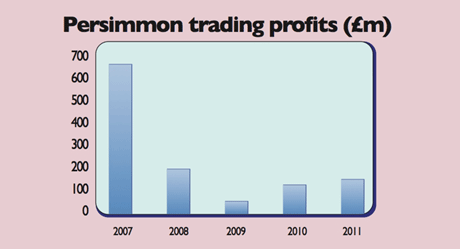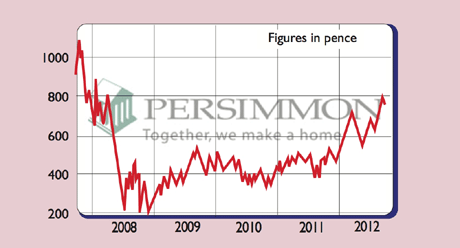Shares in focus: The problem with Persimmon
Housebuilder Persimmon has made some canny business moves in the past. But with Britain's housing market in the doldrums, is it too soon to buy the shares? Phil Oakley investigates.
Get the latest financial news, insights and expert analysis from our award-winning MoneyWeek team, to help you understand what really matters when it comes to your finances.
You are now subscribed
Your newsletter sign-up was successful
Want to add more newsletters?

Twice daily
MoneyWeek
Get the latest financial news, insights and expert analysis from our award-winning MoneyWeek team, to help you understand what really matters when it comes to your finances.

Four times a week
Look After My Bills
Sign up to our free money-saving newsletter, filled with the latest news and expert advice to help you find the best tips and deals for managing your bills. Start saving today!
Persimmon hasmade some canny business moves, but the shares are too risky for us, says Phil Oakley.
The business
Persimmon is one of Britain's biggest housebuilders. Operating out of 24 regional offices, it trades under three main brands: Persimmon Homes, Charles Church and Westbury Partnerships. The core Persimmon business builds and sells houses, bungalows and apartments. Charles Church concentrates on premium properties, while Westbury focuses on social housing.
The company owns 63,786 building plots with planning permission and a further 16,100 acres of strategic land it hopes to build on in the future. It sold 9,360 houses in 2011.
MoneyWeek
Subscribe to MoneyWeek today and get your first six magazine issues absolutely FREE

Sign up to Money Morning
Don't miss the latest investment and personal finances news, market analysis, plus money-saving tips with our free twice-daily newsletter
Don't miss the latest investment and personal finances news, market analysis, plus money-saving tips with our free twice-daily newsletter
The history
Duncan Davidson created Persimmon in 1972. He started out building houses in Yorkshire before branching out to other areas of the country. Davidson then spent the next decade or so increasing the scale of the business before floating Persimmon on the London Stock Exchange in 1985.
After experiencing the ups and downs of the 1980s house-price boom and subsequent bust, the 1990s saw Persimmon start to make some big purchases of other housebuilders. In 1996 it bought Ideal Homes. Bigger deals followed in 2001 and 2006 with the purchases of Beazer and Westbury.
The early 2000s were kind to Persimmon. Plentiful cheap mortgages stoked a British housing boom, which led to soaring profits. By 2008, the boom had turned to bust; Persimmon's profits collapsed and dividend payments were scrapped. Although times were extremely tough, unlike many of its competitors it did not have to ask its shareholders for more money to stay afloat.
Profits are still a long way below the record levels of 2007, but look to be recovering again as Persimmon has cashed in on some smart land buying at the bottom of the market.
The chief executive
Mike Farley has been chief executive since 2006, having joined the company in 1983. He has spent all his career in housebuilding, starting out as a building site foreman in the 1970s. Despite the challenging times, Farley continues to be well compensated, with a total pay packet of £1.9m last year.
Should you buy the shares?
It depends on where you think house prices are going. This is because most of a housebuilder's value is tied up in its land bank. Land values are highly sensitive to changes in house prices. With other building costs relatively predictable, the price of land is the key determinant of a builder's profits.
When buying land, a builder will work out what to pay for it by estimating the selling price of the house he wants to build on it. He then takes away his other building costs and the amount of profit he wants to make. The figure left over is the highest price he should pay for the land.

Rising house prices make existing land more profitable and therefore worth more. The opposite is true for falling prices. Persimmon has a bold strategy to pay a series of dividends worth 620p per share between 2013 and 2021, but to do so it needs a favourable climate for house prices.
The key to paying these dividends rests with the value of its current plots. Many of these were bought at bargain prices during the last recession and are very profitable at current house price levels. A lot also depends on its 16,100 acres of strategic land. If Persimmon can get planning permission for this land then it could make large profits from selling houses built on it.
But who is going to buy them? Mortgage availability remains very low. Banks are less willing to lend and buyers require hefty deposits. Persimmon is having to lend money to the buyers of around one quarter of its houses. This shared equity is becoming a bigger part of its balance sheet and looks unsustainable to us. We think house prices remain too high and that the value of land on Persimmon's books could be worth a lot less than it says it is. With the shares trading at more than asset value, Persimmon looks a very risky investment at current prices. Avoid.
The numbers

Stockmarket code: PSN
Share price: 770p
Net assets (June 2012): £1.9bn
Net cash (June 2012): £135m
P/e (current year estimate): 15.1 times
Price to book value (current): 1.2 times
Yield (prospective): 0%
What the analysts say
Buy: 10
Hold: 6
Sell: 1
Average price target: 748p
Directors' shareholdings
M Farley (CEO): 1,147,753
J Fairburn (FD): 41,214
N Wrigley (chairman): 26,000
Get the latest financial news, insights and expert analysis from our award-winning MoneyWeek team, to help you understand what really matters when it comes to your finances.
Phil spent 13 years as an investment analyst for both stockbroking and fund management companies.
-
 Average income tax by area: The parts of the UK paying the most tax mapped
Average income tax by area: The parts of the UK paying the most tax mappedThe UK’s total income tax bill was £240.7 billion 2022/23, but the tax burden is not spread equally around the country. We look at the towns and boroughs that have the highest average income tax bill.
-
 BBC TV licence fee hike confirmed: can you reduce how much you pay?
BBC TV licence fee hike confirmed: can you reduce how much you pay?The cost of a TV licence fee is set to rise by over 3%, but there are ways to reduce the bill.
-
 Somero: trading this overlooked bargain
Somero: trading this overlooked bargainFeatures Mechanical-screed maker Somero dominates its niche and is attractively valued. Matthew Partridge picks the best way to trade it.
-
 How to find big profits in small companies
How to find big profits in small companiesCover Story The small- and micro-cap sectors are risky and volatile. But with careful research and patience, investors could make huge gains. Matthew Partridge explains how to find the market’s top tiddlers.
-
 The hidden gems on Aim, London's junior market
The hidden gems on Aim, London's junior marketFeatures Aim, London’s junior market, is risky – but you can find solid stocks at low prices. Scott Longley reports.
-
Three Aim-listed firms that will thrive in a post-Brexit world
Opinion Matt Tonge and Victoria Stevens of the Liontrust UK Smaller Companies Fund pick three Aim-listed firms that will survive Brexit turmoil.
-
Fetch! The Chinese small-cap stocks to buy in the Year of the Dog
Opinion Each week, a professional investor tells us where she’d put her money. This week: Tiffany Hsiao of Matthews Asia selects three Chinese small-cap stocks with exciting potential.
-
Small and mid-cap stocks with big potential
Opinion Professional investor Guy Anderson of the Mercantile Investment Trust selects three small and medium-sized firms with promising prospects that the market has missed.
-
 Get cheap, reliable growth from smaller companies
Get cheap, reliable growth from smaller companiesFeatures One of the most reliable long-term investment trends is the long-term outperformance of smaller companies over blue chips. Max King picks some of the best ways to buy into this growth.
-
 Now the bitcoin bubble’s burst, what’s the next big thing?
Now the bitcoin bubble’s burst, what’s the next big thing?Features Forget bitcoin, if you want to increase your wealth faster than most other people, you need to find the next big thing. Merryn Somerset Webb suggests some places to look.